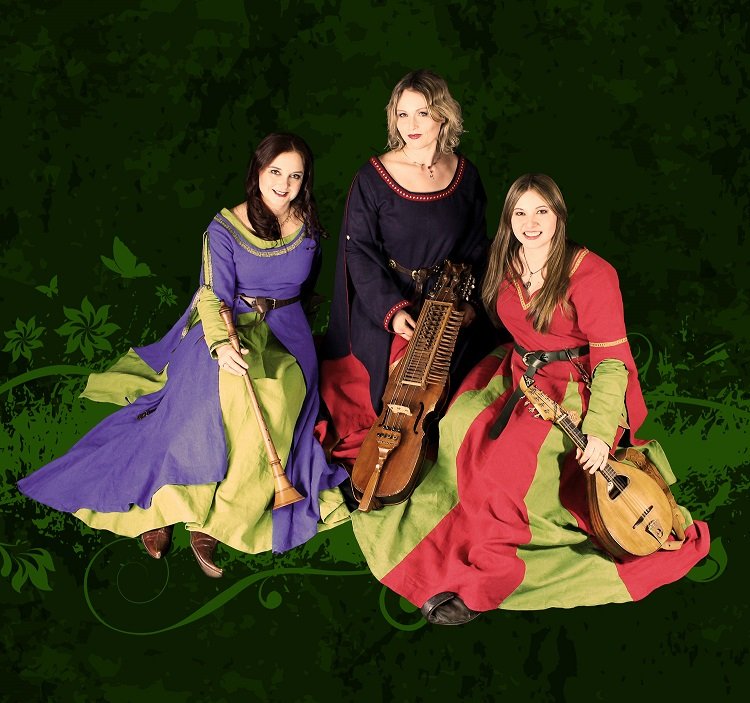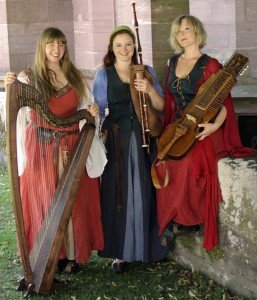It’s Thursday again! 🙂
And that, of course, means that it’s time for another Thursday Theatre. Our brightest spotlights this week are aimed at Die Irrlichter, as our lovely Lena has made a review of their latest album “Zaubergarten”.
Read all about Lena’s thoughts on the dreamy atmosphere this album creates. About the danceable tracks and the easy listening songs. About their fresh new songs and fresh new versions of some lovely traditionals.
Let Lena take you a journey into the world of Die Irrlichter!
Die Irrlichter – Zaubergarten
After waiting 5 years Die Irrlichter finally released their 7th studio album.
A long time of patiently waiting as come to an end.
‘Zaubergarten’ (Magical Garden) is a thematic album that contains mainly soft dreamy songs that invite the listener to dream away. All songs have something to do with magic, it’s either in their story or simply in the music itself. On this album ‘Die Irrlichter’ have made renditions of three well known songs, which I’ll allow myself to call Medieval Evergreens: ‘Sator arepo tenet opera rotas’, ‘Merseburger Zauberspruch’ and ‘Bergtrollets firei (a.k.a. Herr Mannelig)’ are all songs that have been interpreted by lots of bands already and will be interpreted by many other bands in future, for sure. ‘Die Irrlichter’ versions are fitted to the dreamy magical atmosphere of the album.
‘Sator arepo tenet opera rotas’ is one of the oldest and most often covered traditional magic courses of medieval times. The interpretation of ‘Die Irrlichter’ is sung in their typical choir singing, while a danceable atmosphere is being created using lots of flutes and a mystical bagpipe tune.
‘Loscher Bienensegen’ is a mystical song that is accompanied by a soft tune, which can be heard throughout the album.
‘Merseburger Zauberspruch’ is a soft and dreamy ballad that invites the listener to just close the eyes and dream away. It is one of the featured traditionals.
‘Die Nixen’‘s lyrics are by the German author Heinrich Heine and lay out the moral of this storytelling song. ‘Die Irrlichter’ are famous for using this format for their songs. It’s a lovely song that requires the listener to pay close attention to the tale that is being told.
‘Skebergslaten’ is a traditional Swedish harp song. Some mystically played flutes complete this magical instrumental song, carrying it’s beauty to the listener.
‘Zaubergarten’ is another dreamy ballad and the central song of the album. Soft voices, harps and just a pinch of violin once again create a dreamy atmosphere, in which you are invited into this magical garden.
‘Elfenflug’ is the next instrumental song on this album. To me at least, these are the strongest, since it’s only their music that electrifies you. A fresh and vivid song that is hard not to start to dance to.
‘Thora und der Lindwurm’ is another storytelling song, based on an old Islandish saga. The vivid rhythm and the typical female voices of ‘Die Irrlichter’ create their own magic once again.
‘Bergtrollets frieri (a.k.a. Herr Mannelig)’ is the third traditional, which many other artists have played before. This ‘Die Irrlichter’ rendition is a soft ballad.
‘Bourré Abière’ is a French traditional played on a nyckelharpa with an uprising, almost oriental, rhythm that is bound to set you off dancing!
‘Die Fee’ contains the manly yet soft voice of Martin Seifert that sings along with the fairy vocals of ‘Die Irrlichter’. It tells us the story of a young man that has to choose wisely for a wish that will be granted by a fairy. A well known violin played by Charles Matthew Rouse makes the cooperation of ‘Die Irrlichter’ and ‘Die Streuner’ perfect. Another fairytale told in a dreamy song.
‘Mittsommerreigen’ is an almost pagan style instrumental song with flutes and drums that is aptly named ‘Midsommer dance’.
– Lena
‘Die Irrlichter’ are:
Brigitta Jaroschek -Karin: vocals, bass lute, harp, guitar, 12-string zither, mandolin, harp
Stephanie Keup-Büser: vocals, nickelharpa, Renaissance sopranino, flutes, rauschpfeife and chalumeau
Jutta Simon-Alt: vocals, bagpipes, flutes, rauschpfeife, shawm

